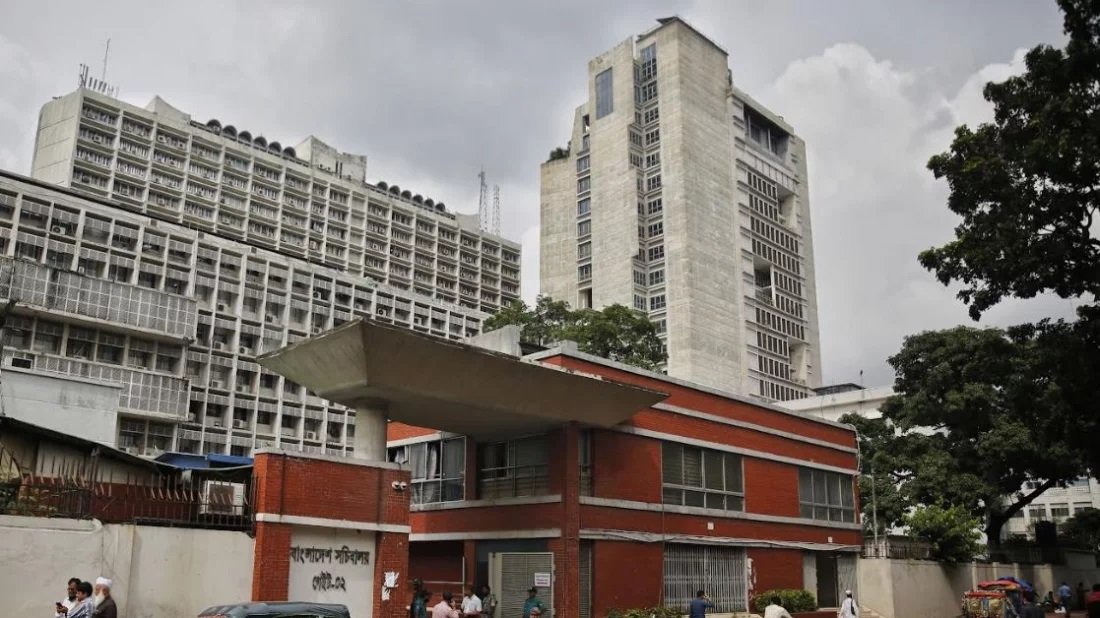PauseMuteLoaded: 50.74%Remaining Time -6:28Close Player
Official letters outlining the directive have already been issued to the divisional commissioners, DCs, and UNOs.
The letters state: "Complete security must be ensured at all government offices. If additional funds are needed for this purpose, those requirements should be communicated. CCTV cameras must be installed in all areas of the offices. Night-time surveillance should be ensured across the premises. Necessary repairs or replacements of doors and windows should be undertaken if needed."
The directive further instructed officials to submit reports to their respective higher authorities detailing the measures undertaken to ensure complete security.
Following directives from the Ministry of Home Affairs and the Cabinet Division, enhanced security protocols have been introduced at the Bangladesh Secretariat.
These include stricter access controls, card reader scanning, and the formulation of a new security policy.
This initiative has been undertaken particularly in response to a fire that broke out in Building 7 of the Secretariat on December 25, during the Christmas holiday.
The government decided to overhaul the overall security system of the Secretariat after the incident, according to sources at the Ministry of Home Affairs.
Sources mentioned that following the fall of the Awami League government on August 5 and the appointment of Dr Muhammad Yunus as the new head of an interim government on August 8, several groups began staging protests in front of the Secretariat over allegations of discrimination.
The protests continued into the nights, culminating in Ansar members entering the Secretariat premises in the evenings after full days of demonstrations, which subsequently led to altercations, stone-pelting, and even gunfire.
Moreover, on August 20, after protests demanding the cancellation of the remaining HSC and equivalent exams and the implementation of “auto pass”, students broke through the main gate of the Secretariat after protesting in front of the Ministry of Finance.
They then entered the Ministry of Education, and in response to their protest, the ministry eventually cancelled the remaining HSC exams and caved in to their demand for "auto pass".
This unauthorized entry into the Secretariat was widely criticized.
A few days later, on August 25, after a full day of demonstrations, thousands of Ansar members continued protesting into the night in front of the Secretariat, trapping many officials and employees inside.
According to eyewitnesses, protesters blocked all entry and exit points starting from noon.
Despite office hours ending at 5pm, staff were unable to leave, and the prolonged protest left many employees hungry and exhausted.
On October 24, students demanding re-evaluation of their HSC results entered the Secretariat again.
The police detained 54 students, later showing arrests for 26 of them and releasing the remaining 28 into their guardians' custody.
In response to these incidents, the government decided to strengthen security across all government offices, including the Secretariat and administrative offices at the district and upazila levels.
The Ministry of Home Affairs has proposed the installation of AI-enabled CCTV cameras that can identify faces, recognize vehicle license plates, and trigger automatic alerts in case of any criminal activity.
The proposal, submitted to the Ministry of Finance in early March, outlines the need for advanced surveillance technology to enhance access control and monitoring.
The new policy includes the following:
- Visitors may only access a department or ministry for which they have obtained permission and must exit within the stipulated time.
- Cardholders must pass through body scanners, metal detectors, and baggage scanners.
- Access will be controlled via card reader scanning at designated gates.
- For those using QR codes, scanners at gates will verify their identity and grant access only after matching the displayed data.
Weapons, explosives, and even licensed firearms are strictly prohibited within the Secretariat premises.
However, licensed weapons may be temporarily held at security checkpoints, and government-issued arms for security personnel are exempted from the ban.
The security measures have already been enhanced.
Additionally, other law enforcement agencies have been deployed inside and outside the Secretariat.
A police officer on duty mentioned that vigilance is now maintained not just during the day but also throughout the night.
Authorities are now more proactive than ever in ensuring comprehensive security, the police said.
Plans are in place to install AI-integrated CCTV cameras capable of facial recognition, vehicle plate detection, and real-time alerts.
These high-tech cameras—sourced from the US and Japan—will be able to function effectively during the day and night.
Initially, 624 such cameras will be installed.
According to the proposal sent to the finance ministry, 74 additional cameras are urgently needed—43 facial recognition cameras at gates and entrances, 20 bullet cameras for perimeter surveillance, four PTZ cameras for wide-angle observation, and seven dome face recognition cameras.
A Ministry of Home Affairs official stated that in 2021, around Tk100 crore was spent on security equipment, including 74 advanced CCTV cameras from the US and China, equipped with night and day vision capabilities.
Four baggage scanners were also installed, although they are now defunct, prompting the need for a fresh initiative, the official said.
Another official added that infrared cameras are being installed that can detect human presence through body heat—even in the dark.
These cameras can capture both images and videos and are already being used in several sensitive areas, the official said.
A senior Dhaka Metropolitan Police (DMP) official confirmed that not just the Secretariat, but enhanced security protocols are being implemented across all government offices nationwide.
The fragile security at the administrative nerve centre cannot be tolerated, and initiatives are underway to secure all public offices.
Home Affairs Adviser Lt Gen (Retd) Md Jahangir Alam Chowdhury said that securing the Secretariat has been given the highest priority.
The process has already begun and will continue to be implemented in the coming days, the adviser said.








